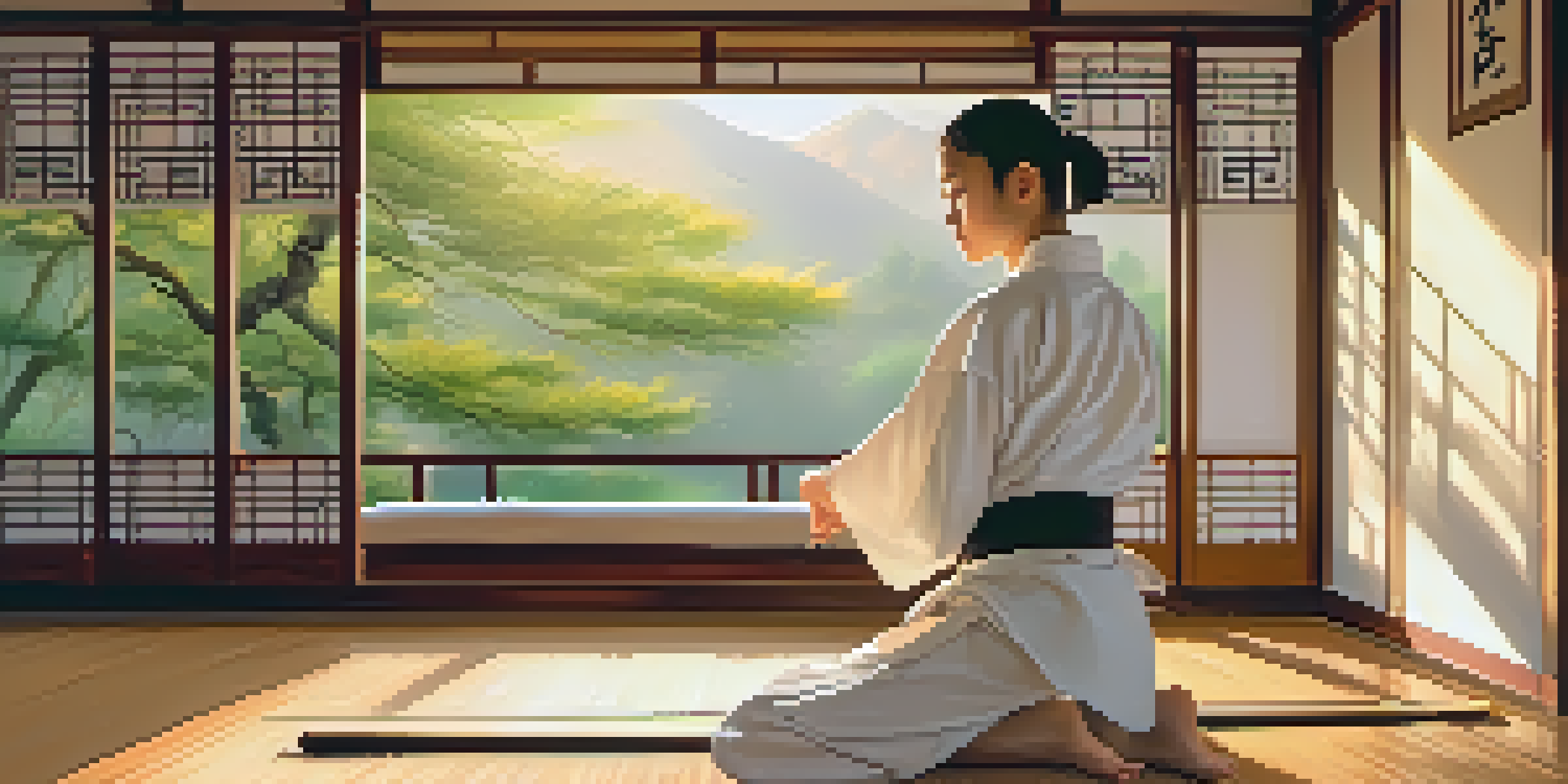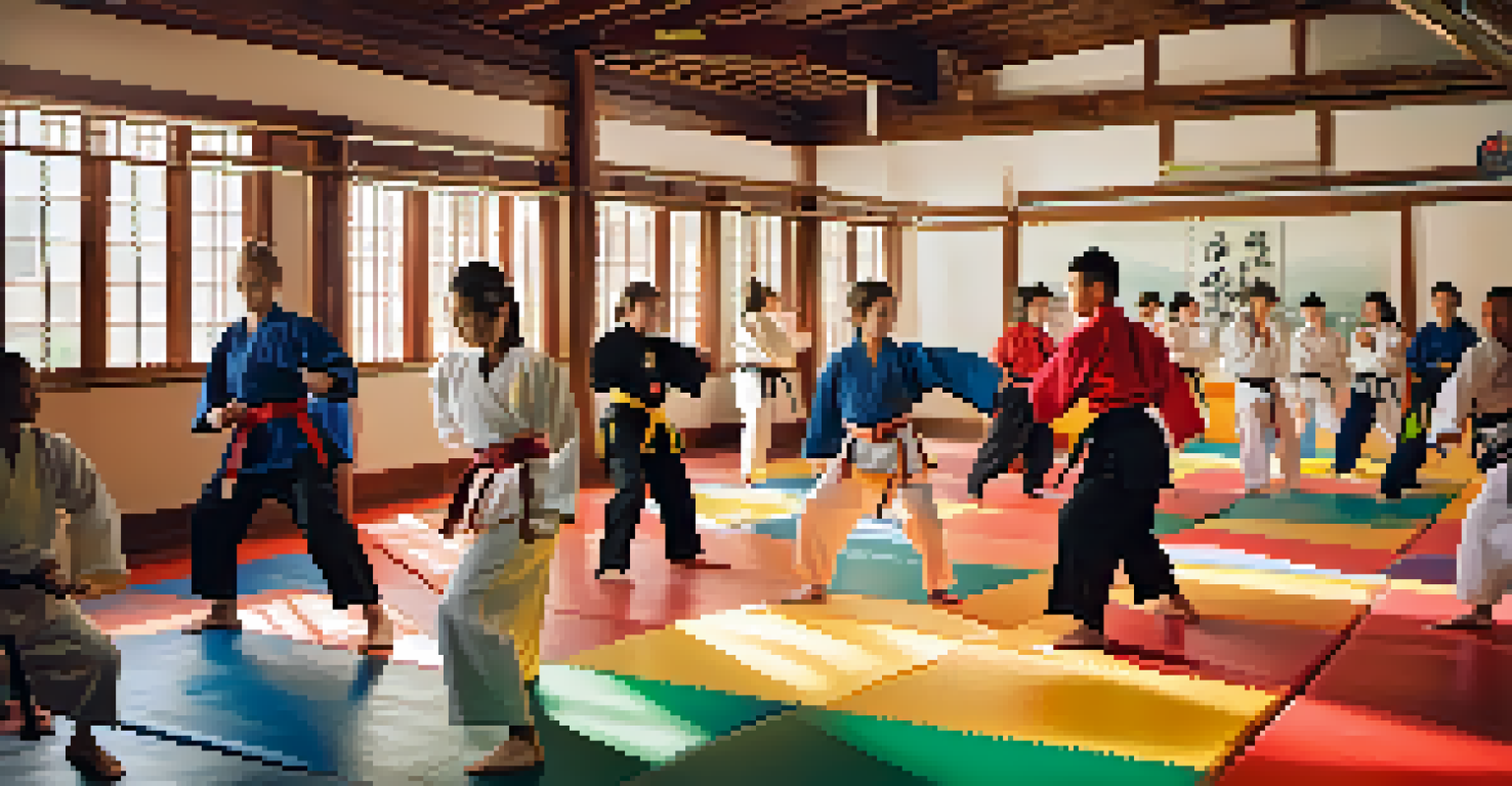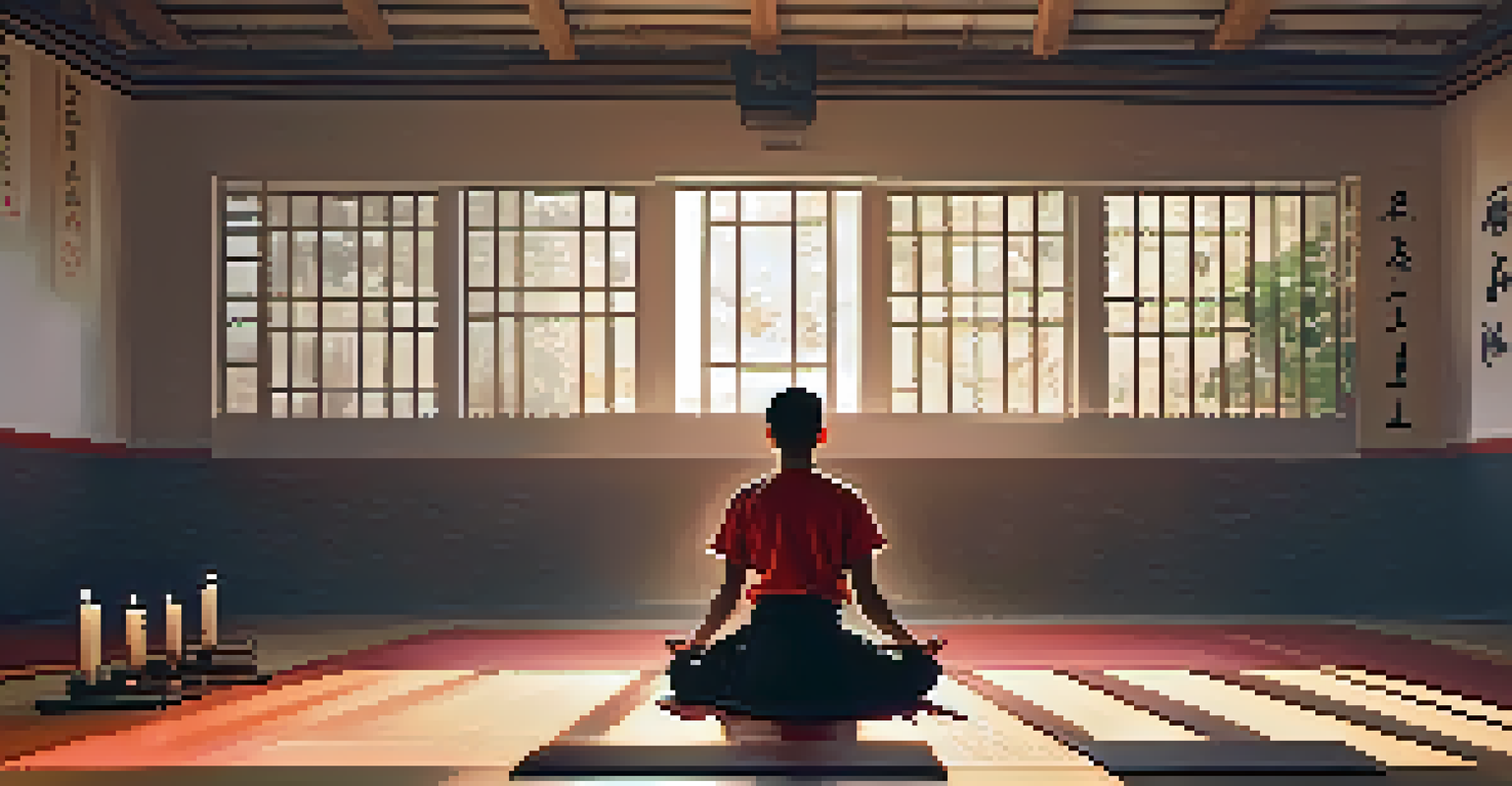Martial Arts: A Journey of Self-Discovery and Personal Growth

Understanding Martial Arts: More Than Just Fighting
Martial arts encompasses a variety of disciplines that go beyond physical combat. It's a path that includes mental and spiritual training, making it a holistic practice. Whether it's karate, judo, or taekwondo, each style offers unique lessons that contribute to personal growth.
The ultimate aim of martial arts is not having to use them.
At its core, martial arts teaches respect, discipline, and perseverance. Practitioners learn to honor their instructors, peers, and themselves, fostering a sense of community. This respect extends beyond the dojo, influencing how individuals interact in their daily lives.
Moreover, martial arts encourages self-reflection. As students progress through belts, they are often prompted to assess their goals and motivations, prompting a deeper understanding of themselves. This journey of introspection can lead to profound personal insights.
Building Confidence Through Skill Mastery
One of the most significant benefits of martial arts is the boost in self-confidence it provides. As students learn new techniques and successfully execute them, they gain a sense of accomplishment. This skill mastery serves as a foundation for building self-esteem.

Imagine being able to defend yourself or execute a perfect kick; these achievements can transform how you view your abilities. The practice of overcoming challenges, whether physical or mental, reinforces the belief that you can succeed in various aspects of life.
Martial Arts: A Holistic Journey
Martial arts encompasses physical, mental, and spiritual training, fostering personal growth and self-discovery.
Additionally, the supportive environment of a martial arts class allows individuals to celebrate their victories, no matter how small. This communal encouragement fosters a sense of belonging and further enhances self-confidence.
Cultivating Discipline and Focus in Daily Life
Discipline is a core tenet of martial arts training. From the moment a student steps onto the mat, they learn to adhere to a structured routine that demands commitment and focus. This discipline often spills over into other areas of life, helping practitioners stay organized and goal-oriented.
Martial arts is not about fighting; it's about building character and developing self-discipline.
For instance, many martial artists establish training schedules that require them to manage their time effectively. Juggling classes, work, and personal responsibilities teaches them how to prioritize their tasks, leading to improved productivity.
Moreover, the focus required during training sessions enhances concentration skills. Practitioners learn to quiet their minds and concentrate on their movements, which can improve their ability to focus in academic and professional settings as well.
Emotional Regulation Through Physical Training
Martial arts serves as an excellent outlet for emotional regulation. The physical exertion involved in training allows individuals to release pent-up energy and stress, leading to improved mood and mental clarity. This cathartic experience can be incredibly therapeutic.
In addition, martial arts teaches practitioners how to respond to challenging situations with composure. Through sparring and controlled scenarios, students learn to manage their emotions under pressure. This skill is invaluable, as it translates to better handling of stress in everyday life.
Building Confidence Through Mastery
Skill mastery in martial arts boosts self-esteem and empowers individuals to overcome challenges in various aspects of life.
As students progress, they often find themselves better equipped to confront their fears and anxieties. The empowerment that comes from mastering techniques translates to a greater sense of control over one's emotional landscape.
The Role of Community in Personal Development
A unique aspect of martial arts is the sense of community it fosters. Training alongside others creates bonds that go beyond the dojo, often leading to lifelong friendships. This camaraderie provides a support system that encourages personal growth.
In many martial arts schools, students participate in group activities, competitions, and events that build these connections. The shared experiences help individuals feel valued and understood, reinforcing the idea that they are not alone on their journey.
Additionally, this community often encourages individuals to step outside their comfort zones. Whether it's participating in a tournament or leading a class, the support from peers can empower members to pursue new challenges.
Setting and Achieving Personal Goals
Martial arts emphasizes the importance of setting and achieving goals. Whether it's earning a new belt or mastering a complex technique, students learn to define their aspirations clearly. This skill translates to other areas of life, where goal-setting can lead to personal and professional success.
The process of training toward a specific goal teaches individuals about patience and persistence. Each small victory builds momentum, reinforcing the idea that consistent effort leads to achievement. It's a powerful lesson that can inspire individuals to pursue their dreams relentlessly.
Community Fosters Personal Growth
The supportive environment within martial arts cultivates a sense of belonging and encourages individuals to pursue new challenges.
Moreover, the feedback from instructors and peers during this journey provides valuable insights. Constructive criticism helps students refine their approach, making them more adaptable and resilient in the face of challenges.
Mindfulness and Self-Discipline Through Martial Arts
Practicing martial arts encourages mindfulness, a quality that enhances self-awareness and emotional intelligence. Focusing on breathing, technique, and movement can ground practitioners in the present moment, helping to alleviate anxiety and stress.
This mindfulness extends beyond training sessions, influencing how individuals approach life outside the dojo. Practitioners often find themselves more attuned to their thoughts and emotions, leading to better decision-making and healthier relationships.

Furthermore, the self-discipline cultivated through martial arts helps individuals resist distractions and stay committed to their goals. This combination of mindfulness and discipline creates a powerful framework for personal growth.
Conclusion: The Lifelong Journey of Growth
In conclusion, martial arts is not just about physical prowess; it's a journey of self-discovery and personal growth. The skills and lessons learned on the mat extend far beyond the dojo, influencing every facet of life. Through discipline, community, and emotional regulation, practitioners evolve into their best selves.
The beauty of martial arts lies in its inclusivity; it welcomes individuals of all ages and backgrounds, offering each person a unique path to personal development. Whether you're a seasoned practitioner or just starting, the journey is one of continuous learning and growth.
Ultimately, martial arts teaches us that the journey is just as important as the destination. Embracing the challenges and triumphs along the way can lead to a more fulfilling and enriched life.